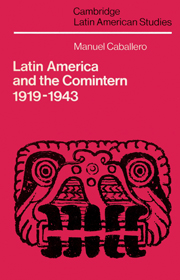Book contents
- Frontmatter
- Contents
- Acknowledgements
- Abbreviations
- Introduction
- PART ONE THE WORLD COMMUNIST PARTY
- PART TWO THE THEORY COMES AFTER
- 4 The discovery of America
- 5 Latin America in the world revolution
- 6 Power as theory
- PART THREE THE QUESTION OF POWER
- Conclusion
- Appendix: dramatis persona
- Commentary on sources
- Notes
- Bibliography
- Index
- CAMBRIDGE LATIN AMERICAN STUDIES
6 - Power as theory
Published online by Cambridge University Press: 07 October 2009
- Frontmatter
- Contents
- Acknowledgements
- Abbreviations
- Introduction
- PART ONE THE WORLD COMMUNIST PARTY
- PART TWO THE THEORY COMES AFTER
- 4 The discovery of America
- 5 Latin America in the world revolution
- 6 Power as theory
- PART THREE THE QUESTION OF POWER
- Conclusion
- Appendix: dramatis persona
- Commentary on sources
- Notes
- Bibliography
- Index
- CAMBRIDGE LATIN AMERICAN STUDIES
Summary
It should not be forgotten that those who are debating all the preceding problems are Marxists. Therefore, the most important questions they had to ventilate at the 1928 World Congress, at the 1929 meeting of Buenos Aires and in the following years, had to be related, and were related to the conditions and character of the class struggle. It should also not be forgotten that those who are discussing these problems are Leninists who are Machiavellians too. Thus, at any moment in their political activity, at any moment of their life, they have to deal with the problem of power, both theoretically and practically. Their first approach to this question came theoretically, in the debates over two main issues: the first, related to the ‘main enemy’; the second, to the leading force in the forthcoming revolution.
Enemies
For Marxists, the main enemy is of course capitalism. For Leninists, the main enemy has to be imperialism. However, as Leninists and particularly for those who were Latin Americans, it was understood that imperialism was not a unified world phenomenon, but rather demonstrated distinct national origins.
In America, it might be tempting to identify it as American imperialism. But the problem was somewhat more complicated, at that moment. British imperialism was still strong in Latin America, but the question has to be examined not from the economic point of view, but from a political one, that is, taking into consideration a given circumstance.
- Type
- Chapter
- Information
- Latin America and the Comintern, 1919–1943 , pp. 97 - 106Publisher: Cambridge University PressPrint publication year: 1987



